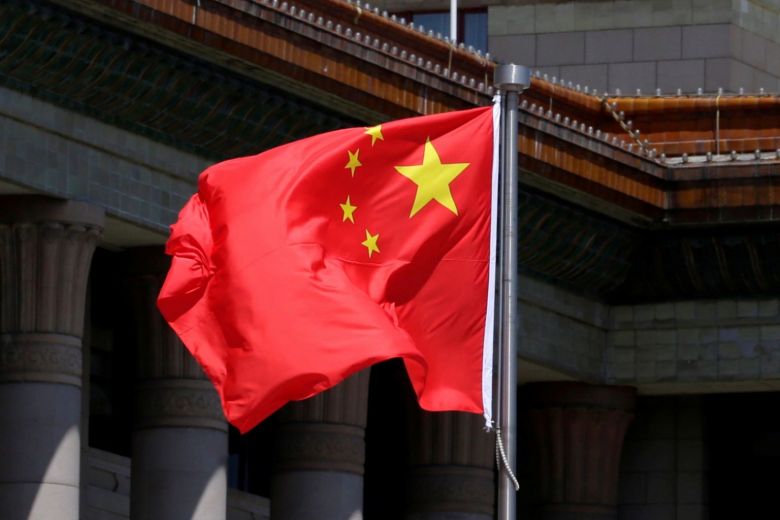Chinese embassy responds to report on influence operations in Singapore
Sign up now: Get ST's newsletters delivered to your inbox

Responding in a post on its Facebook page, the Chinese Embassy said the exchanges and cooperation between China and Singapore in various fields - including the economy, trade and people-to-people ties - reflect the amicable relations between the two countries.
PHOTO: REUTERS
SINGAPORE - The Chinese Embassy in Singapore on Friday (July 19) rebutted a report by a United States-based scholar, saying that its assertions of Beijing conducting influence operations here are "groundless" and "distorted from truth".
US think-tank Jamestown Foundation had on Tuesday published an analysis by Global Taiwan Institute executive director Russell Hsiao, who wrote that China is using cultural organisations, clan associations, business associations and youth programmes to exert influence on Chinese Singaporeans.
Mr Hsiao said the Chinese Communist Party's (CCP) fundamental purpose is to impose a Chinese identity on multiracial Singapore so that it will align more closely with China's expanding interests.
The Straits Times, Chinese daily Lianhe Zaobao and online news outlet Today ran stories on the report.
Responding in a post on its Facebook page on Friday, the Chinese Embassy said the exchanges and cooperation between China and Singapore in various fields - including the economy, trade and people-to-people ties - reflect the amicable relations between the two countries.
This has come about because of joint efforts by the two governments and all sectors of society, said a spokesman for the Chinese Embassy.
"The unique connections in history and culture between China and Singapore, a natural advantage in promoting bilateral cooperation, are unfortunately taken by someone as an excuse for attack, thus hurting not only China but also Singapore," the spokesman said. "Lies are lies. The more they are repeated, the more nonsense they are."
The spokesman described the report as "absurd", and said it had a clear purpose - "to alienate the friendship of our two peoples and hinder normal exchanges between the two countries".
Singapore is a friendly neighbour of China, he added, saying China is "pleased to see Singapore's achievements of exchanges and cooperation with all countries".
"We respect Singapore as a multi-cultural and multi-religious state and will remain committed to developing friendly relations with Singapore on the basis of mutual respect, equality and mutual benefit," he said.
"This serves the fundamental and long-term interests of the two countries and their peoples."
Mr Hsiao, who also wrote an article last month on the CCP's influence operations in Japan, had said China's propaganda efforts in Singapore aim to promote the narrative of a "greater China", one that includes all ethnic Chinese irrespective of nationality.
He highlighted Chinese clan associations in Singapore as important links through which China conducts outreach via cultural exchanges to revolutionary history sites, concerts for singing communist songs, and visits to ancestral homes in China.
Mr Hsiao also asserted that "business associations in Singapore act as the most powerful lobby for Chinese interests". China, he added, exerts leverage over Singapore businessmen by making it harder for them to get contracts, licences, permits and loans in China.
On using the media to sway public opinion, Mr Hsiao had said the Singapore Government "exerts tight controls over the media", which limits China's influence.
However, he noted that Lianhe Zaobao's news website attracts more than five million page views daily in China.
"Yet, given the economic dependency between local Chinese-language media companies and the PRC market, this raises questions as to whether local outlets (such as Zaobao) are selling news to Singapore, or selling news to markets in the PRC - and whether they might self-censor as a result," Mr Hsiao added.
In response to the report, Lianhe Zaobao editor Goh Sin Teck said in an article yesterday that the mainland China market is important to Zaobao, and makes up the bulk of the news outlet's overseas readers.
"But what to report, and how to report it - our editorial department bases that on professional news judgment," he said. "In fact, accurate, objective and neutral reports and discussion are how Zaobao provides value."
Lianhe Zaobao quoted Singapore Federation of Chinese Clan Associations president Tan Aik Hock, who said the group would continue to strengthen consciousness of being Singaporean and ensure that it is not influenced by messages from China.
It also quoted Mr Roland Ng San Tiong, president of the Singapore Chinese Chamber of Commerce & Industry, who responded to Mr Hsiao's report and questioned its accuracy.
Mr Ng also said the local Chinese business associations would not have gotten involved during the periods when ties between Singapore and China were frayed.
"The Chamber of Commerce has always been focused on business. We do not influence the government administration and our activities are not related to politics."


